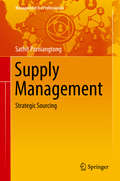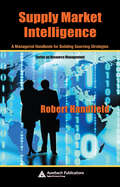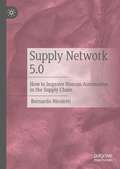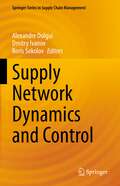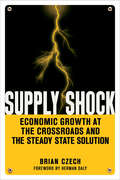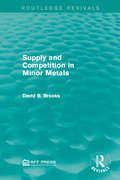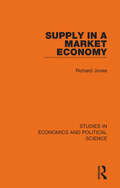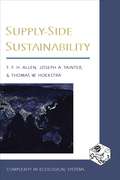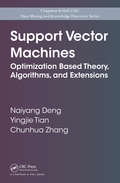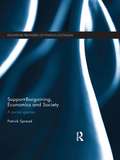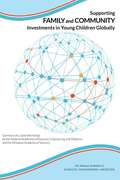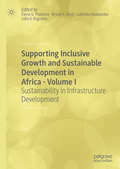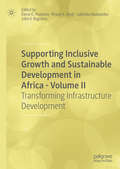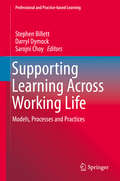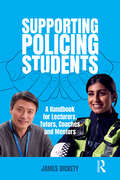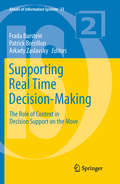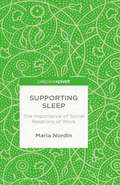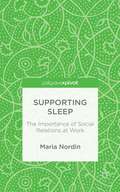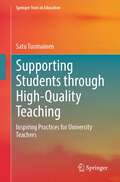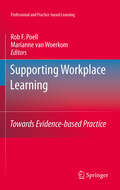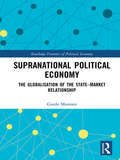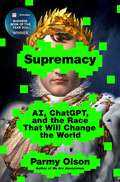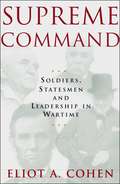- Table View
- List View
Supply Management
by Sathit ParniangtongThis book takes a process approach of identifying, evaluating, selecting, managing and developing suppliers to create more value for customers. It begins by outlining the mental shift necessary to build robust relationships with suppliers. Next, the book details strategic sourcing methodology: a step-by-step approach for creating productive relationships with key suppliers, providing illustrations and examples from the author s experience throughout. The third and final part of the book provides details of a comprehensive process developed to arm the negotiation team with all facts necessary to reach desired outcomes. This detailed step-by-step process consists of negotiation strategy and case building, supplier response and positioning, negotiation planning, discussions, and resolution, and supplier evaluation. In addition, the book highlights best practices in strategic sourcing representing tactics for buyers to leverage their buying power to ensure they attain full value. These best practices are drawn from several strategic sourcing projects carried out for leading companies in the USA over several years. "
Supply Market Intelligence: A Managerial Handbook for Building Sourcing Strategies (Resource Management)
by Robert HandfieldSupply Market Intelligence: A Managerial Handbook for Building Sourcing Strategies begins by defining supply market intelligence and discussing opportunities, the establishment of a project team, and conducting an internal business intelligence assessment. The book then examines the development of business and market intelligence, supplier evaluations, and sourcing strategies. It also explores how to execute a sourcing strategy, manage a strategic supplier relationship, and redesign an organization for effective supply-chain intelligence and strategic sourcing. This volume offers a benchmarking framework covering all facets of supply-chain management, and includes best practices and case studies of world-class companies.
Supply Network 5.0: How to Improve Human Automation in the Supply Chain
by Bernardo NicolettiThis book examines how Industry 5.0 can be defined and implemented for Supply Chain Management and what essential characteristics it has. In outlining Supply Network 5.0, it examines how humans and machines, especially robotic process automation systems and artificial intelligence tools, will work together in the New Normal. To provide a comprehensive overview, it proposes a new conceptualization of Supply Network 5.0’s business model based on the Business Model Canvas and SCOR framework and provides a dedicated analysis of the proposed solutions and real-world implications of its implementation. Including case studies from several different sectors and including significant analysis on the impact of the Covid-19 pandemic, this book will provide a cutting-edge perspective for academics and students of supply chain management, digital business and innovation.
Supply Network Dynamics and Control (Springer Series in Supply Chain Management #20)
by Dmitry Ivanov Alexandre Dolgui Boris SokolovThis book provides a comprehensive overview of recent developments in network dynamics and control with applications to supply chains, manufacturing and logistics systems. It systemizes these developments in the form of new taxonomies and methodological principles to shape the research domain of supply network dynamics control. Uniquely, the book links the fundamentals of control and system theories and artificial intelligence with supply chain and operations management. It addresses the needs of researchers and practitioners alike, revealing the challenges and opportunities of supply chain and operations management by means of dynamic system analysis.
Supply Shock: Economic Growth at the Crossroads and the Steady State Solution
by Brian CzechPoliticians, economists, and Wall Street would have us believe that limitless economic expansion is the Holy Grail, and that there is no conflict between growing the economy and protecting the environment. Supply Shock debunks these widely accepted myths and demonstrates that we are in fact navigating the end of the era of economic growth, and that the only sustainable alternative is the development of a steady state economy.Starting with a refreshingly accessible, comprehensive critique of economic growth, the author engages readers in an enormous topic that affects everyone in every country. Publisher's Weekly favorably compared Czech to Carl Sagan for popularizing their difficult subjects; Supply Shock shows why.Czech presents a compelling alternative to growth based on keen scientific, economic, and political insights including:The "trophic theory of money"The overlooked source of technological progress that prevents us from reconciling growth and environmental protectionBold yet practical policies for establishing a steady state economy.Supply Shock leaves no doubt that the biggest idea of the 20th century – economic growth – has become the biggest problem of the 21st. Required reading for anyone concerned about the world our children and grandchildren will inherit, this landmark work lays a solid foundation for a new economic model, perhaps in time for preventing global catastrophes; certainly in time for lessening the damages.
Supply and Competition in Minor Metals (Routledge Revivals)
by David B. BrooksAn interest in the minor metals – termed "minor" as their annual production is relatively small – had been developing for many years. This study, first published in 1965, examines patterns of supply that can be identified as underlying the production of minor metals, and then uses these patterns to investigate the nature and degree of competition in the production of minor metals. This book will be of interest to students of environmental studies.
Supply in a Market Economy (Studies in Economics and Political Science)
by Richard JonesOriginally published in 1976, Supply in a Market Economy was a new kind of introductory micro-economics text which both assesses the usefulness of traditional theory in tackling social and economic problems and compares and contrasts the alternative approaches to the practical problems inherent in the allocation of scarce resources. Richard Jones has succeeded in bringing together the most useful features of a standard microeconomics theory book with empirical and applied material more usually dealt with separately in second year surveys of industrial organisation. The book gives full coverage to the standard theories of the firm, of production, of cost and scale, and of location, to recent critiques of these theories and to alternative approaches now being proposed. Integrated into this theoretical background is a clear analysis of the relationship of these theories to market structures and the economics of industry, and a ‘real-world’ examination of markets in action – with individual sections on the control of rents, on the water supply industry, on the effect of taxation on commodities, and on the economics of crime and its prevention. Supply in a Market Economy would prove to be an invaluable new course-book for first and second year students of microeconomics at the time and particularly for those non-specialists who were impatient to see the relevance and applications of traditional theory to real problems. Now it can be read in its historical context.
Supply-Side Sustainability (Complexity in Ecological Systems)
by Timothy Allen Joseph Tainter Thomas HoekstraWhile environmentalists insist that lower rates of consumption of natural resources are essential for a sustainable future, many economists dismiss the notion that resource limits act to constrain modern, creative societies. The conflict between these views tinges political debate at all levels and hinders our ability to plan for the future.Supply-Side Sustainability offers a fresh approach to this dilemma by integrating ecological and social science approaches in an interdisciplinary treatment of sustainability. Written by two ecologists and an anthropologist, this book discusses organisms, landscapes, populations, communities, biomes, the biosphere, ecosystems and energy flows, as well as patterns of sustainability and collapse in human societies, from hunter-gatherer groups to empires to today's industrial world. These diverse topics are integrated within a new framework that translates the authors' advances in hierarchy and complexity theory into a form useful to professionals in science, government, and business.The result is a much-needed blueprint for a cost-effective management regime, one that makes problem-solving efforts themselves sustainable over time. The authors demonstrate that long-term, cost-effective resource management can be achieved by managing the contexts of productive systems, rather than by managing the commodities that natural systems produce.
Support Vector Machines: Optimization Based Theory, Algorithms, and Extensions (Chapman & Hall/CRC Data Mining and Knowledge Discovery Series)
by Yingjie Tian Chunhua Zhang Naiyang DengSupport Vector Machines: Optimization Based Theory, Algorithms, and Extensions presents an accessible treatment of the two main components of support vector machines (SVMs)-classification problems and regression problems. The book emphasizes the close connection between optimization theory and SVMs since optimization is one of the pillars on which
Support-Bargaining, Economics and Society: A Social Species (Routledge Frontiers of Political Economy)
by Patrick SpreadSupport-Bargaining, Economics and Society links support-bargaining to Darwin's theory of natural selection and traces the implications of support-bargaining and money-bargaining across society. It provides a wholly different account of the functioning of human societies from anything that has gone before. Social scientists, ever since there have been such people, have missed the crucial human characteristic – the propensity to seek support – that has given rise to group formation and the evolution of human society.
Supporting Family and Community Investments in Young Children Globally: Summary of a Joint Workshop by the National Academies of Sciences, Engineering, and Medicine and the Ethiopian Academy of Sciences
by Engineering Medicine National Academies of SciencesTo examine the science, policy, and practice surrounding supporting family and community investments in young children globally and children in acute disruptions, the National Academies of Sciences, Engineering, and Medicine held a workshop in partnership with the Ethiopian Academy of Sciences in Addis Ababa, Ethiopia, from July 27-29, 2015. The workshop examined topics related to supporting family and community investments in young children globally. Examples of types of investments included financial and human capital. Participants also discussed how systems can better support children, families, and communities through acute disruptions such as the Ebola outbreak. Over the course of the 3-day workshop, researchers, policy makers, program practitioners, funders, young influencers, and other experts from 19 countries discussed how best to support family and community investments across areas of health, education, nutrition, social protection, and other service domains. This report summarizes the presentations and discussions from the workshop.
Supporting HEROes with Technology Innovation: How IT Professionals and Employees Can Work Together to Create Customer-Focused Technology Solutions
by Josh Bernoff Ted SchadlerSocial technologies like Facebook, Twitter, YouTube, and Flickr have tremendous power to serve your customers, and these technologies are literally at your employees' fingertips. This chapter explains how IT professionals and employee HEROes-Highly Empowered and Resourceful Operatives-must share the responsibility of technological leadership if your company is to become capable of employee-driven, customer-focused innovation. IT's new role is not to run all your HERO-driven technology projects. Instead, your IT department must learn to support HERO initiatives by finding and assembling the best technologies, exposing HEROes to them, and managing collaboration activities. Using rich examples from Aflac and Best Buy, authors Josh Bernoff-coauthor of "Groundswell"-and Ted Schadler show you a whole new way to look at technology in the corporate world-a world in which your IT department no longer operates isolated systems, but instead supports ubiquitous business and social technologies. This chapter was originally published as Chapter 13 of Empowered: Unleash Your Employees, Energize Your Customers, and Transform Your Business
Supporting Inclusive Growth and Sustainable Development in Africa - Volume I: Sustainability in Infrastructure Development
by Elena G. Popkova Bruno S. Sergi Julia V. Ragulina Lubinda HaabazokaThis edited volume explores and dissects Africa's economic growth and sustainable development using an optimal conceptual model of the progressive continent's development up to and until 2030. Africa is studied not against the background of developed (OECD) and leading developing (e.g. BRICS) countries, but as a separate economy and as a self-sufficient region which follows its own priorities, and implements its own unique opportunities and vectors of growth and development. This first volume addresses the contemporary and topical issues of inclusive growth, digital modernisation, and sustainable development, recommending policy outcomes for the future.
Supporting Inclusive Growth and Sustainable Development in Africa - Volume II: Transforming Infrastructure Development
by Elena G. Popkova Bruno S. Sergi Julia V. Ragulina Lubinda HaabazokaThis edited volume explores and dissects Africa's economic growth and sustainable development using an optimal conceptual model of the progressive continent's development up to and until 2030. Africa is studied not against the background of developed (OECD) and leading developing (e.g. BRICS) countries, but as a separate economy and as a self-sufficient region which follows its own priorities, and implements its own unique opportunities and vectors of growth and development. This volume addresses the contemporary and topical issues of inclusive growth, digital modernisation, and sustainable development, recommending policy outcomes for the future.
Supporting Learning Across Working Life
by Stephen Billett Darryl Dymock Sarojni ChoyThis volume considers, rethinks and reorganizes how support for learning across working lifecan be best conceptualized, organized and enacted. It considers educational and learning support processes that include approaches thatfit well within working lives and workplaces, and support work and learning asa co-occurrence. These are the key focuses for individual and collectivecontributions to this edited volume, which provide discussions about whatconstitutes learning across working lives and how this differs from lifelonglearning and lifelong education. Accounts of learning across the working livesof social workers, doctors working in hospitals and in general practice,teaching, aviation, nursing, mining, aged care and more. These accounts advancea range of ways in which workers' learning across working lives is beingsupported and how this support is also linked to other changes, such as to theoccupational practice in which they engage.
Supporting Policing Students: A Handbook for Lecturers, Tutors, Coaches and Mentors
by James DicketyThis is an invaluable guide for those involved in supporting policing students, including lecturers, tutors, trainers, mentors and coaches. It integrates quality research and practice to help anyone in these roles provide optimal support and guidance to their policing students. Shaping the next generation of policing officers and staff comes with a unique set of challenges, so chapters cover a myriad of useful subjects related to coaching models and theories and how to apply these in a policing context. Additionally, you will find insightful teaching tips, including effective feedback strategies and guidance on addressing challenging topics like domestic abuse and courtroom appearances. Accessibly written, this book can be explored from start to finish or used as a reference guide, and includes reflective exercises and real-life policing examples to help you apply theory to practice, creating an enriching learning experience for both you and your students.
Supporting Real Time Decision-Making
by Frada Burstein Arkady Zaslavsky Patrick BrézillonThis volume of Annals of Information Systems will acknowledge the twentieth anniversary of the founding of the International Society for Decision Support Systems (ISDSS) by documenting some of the current best practices in teaching and research and envisioning the next twenty years in the decision support systems field. The volume is intended to complement existing DSS literature by offering an outlet for thoughts and research particularly suited to the theme of describing the next twenty years in the area of decision support. Several subthemes are planned for the volume. One subtheme draws on the assessments of internationally known DSS researchers to evaluate where the field has been and what has been accomplished. A second subtheme of the volume will be describing the current best practices of DSS research and teaching efforts. A third subtheme will be an assessment by top DSS scholars on where the DSS discipline needs to focus in the future. The tone of this volume is one of enthusiasm for the potential contributions to come in the area of DSS; contributions that must incorporate an understanding of what has been accomplished in the past, build on the best practices of today, and be integrated into future decision making practices.
Supporting Sleep: The Importance of Social Relations at Work
by M. NordinSocial support and sleep are both health promoting factors and important in the prevention of illness and sick-leave. Promoting healthy work by providing good conditions for strong social relationships and by preventing bullying or harassment can improve sleep and consequently employee health, increasing work productivity and efficiency overall.
Supporting Students through High-Quality Teaching: Inspiring Practices for University Teachers (Springer Texts in Education)
by Satu TuomainenThis book provides a Finnish perspective on high-quality teaching in higher education and explores Finnish approaches on teaching, learning and supporting students. It addresses the concepts of quality in teaching, teaching excellence and effective teaching in today’s higher education in which the student body has become increasingly international and heterogenous. The book discusses how the role of the teacher has changed from authority to facilitator in the past decades while many students still value their university experience based on the teachers they encounter. The book provides a practitioner view on how students can be supported through communication, compassion and expertise and how professional and pedagogical development are essential for high-quality teaching in an increasingly competitive, diverse and online world of higher education. The book introduces the principles of Finnish higher education and universities, and the Finnish education system in connection with the approach to teaching, teacher education and the highly valued profession of a teacher. What is good teaching in higher education? It can consist of the learning environment, the location, the students and the teacher, and many studies show that effective, compassionate, skilled and humanist teachers will leave their mark on students. It is also equally important for teachers to invest in pedagogical training and conduct research on teaching practices, experiments and students’ perceptions as part of professional development. International classrooms also require specific considerations, as does online learning. The COVID-19 pandemic forced a substantial transfer to online and blended learning in higher education, but can quality teaching exist online, or have we passed the baton to students to be in charge of their learning, to study even more independently?
Supporting Workplace Learning: Towards Evidence-based Practice
by Marianne Van Woerkom Rob F. PoellDuring the 1990s, the workplace was rediscovered as a rich source of learning. The issue of workplace learning has since received increasing attention from academics and practitioners alike but is still under-researched empirically. This book brings together a range of state-of-the-art research papers addressing interventions to support learning in the workplace. The authors are experienced international scholars who have an interest in making HRD and workplace learning practices more evidence-based through practical relevant research. Although workplace learning is largely an autonomous process, many organizations want to manage it as part of their broader HRD strategy. There are limits, however, to the extent to which the complex dynamics of learning in the workplace can be guided in pre-determined desirable directions. This tension between the possible strengths of workplace learning and the limits of managing it is at the heart of this volume. The book is broken into three sections. The first section deals with workplace learning interventions, including HRD practitioners' strategies, training and development activities, and e-learning programs. The second section investigates the impact of social support, or lack thereof, in workplace learning, such as mentoring, coaching, and socialization practices. The third section addresses collective learning in the workplace, looking at teams, knowledge productivity, and collaborative capability building.
Supranational Political Economy: The Globalisation of the State–Market Relationship (Routledge Frontiers of Political Economy)
by Guido MontaniWith the ending of the Cold War and the rise of a nationalistic ‘America First’ strategy, the post-war liberal international order, based upon the hegemonic power of the USA, is fading away. In its place, a multipolar world is emerging which, while offering some the hope of a better future, is also open to disorder and instability. This book offers an insight into the relationship between politics and economics in this new era. As an alternative, this volume argues for a form of global governance that will offer a better balance between politics and economics, based on a supranational approach. A supranational approach in which world powers and UN member states can work in agreement would follow the principle on which European political and economic integration was built. The system put forward here is based on a Keynesian world clearing union and a reform of the World Trade Organization and a United Nations budget, which would accelerate the convergence of rich and poor countries in the aim of a more sustainable global system. This book demonstrates that globalisations and today’s ecological challenges are both a cause of social discontent and an opportunity. Supranational institutions can greatly increase our ability to address global risks, and this book shows how a 'supranational' world order could reduce the uncertainty of the transition from the post-war order to the future multipolar order. The supranational principle enables us to view globalisation, world capitalism and the ecological crisis not only as causes of inequality, poverty and social instability, but also as processes that can be governed. Wise politicians and political parties cannot let the future of humanity be decided by the precarious equilibrium of the Westphalia system. In post-war Europe a group of nation states, once fierce enemies, embarked on a process of integration which led to the abolition of inter-European national borders. With supranational global governance, the same could be achieved in the global system.
Supremacy: AI, ChatGPT, and the Race that Will Change the World
by Parmy OlsonWINNER OF THE THE FINANCIAL TIMES AND SCHRODERS 2024 BUSINESS BOOK OF THE YEAR AWARDIn November of 2022, a webpage was posted online with a simple text box. It was an AI chatbot called ChatGPT, and was unlike any app people had used before. It was more human than a customer service agent, more convenient than a Google search. Behind the scenes, battles for control and prestige between the world’s two leading AI firms, OpenAI and DeepMind, who now steers Google's AI efforts, has remained elusive - until now.In Supremacy, Olson, tech writer at Bloomberg, tells the astonishing story of the battle between these two AI firms, their struggles to use their tech for good, and the hazardous direction they could go as they serve two tech Goliaths whose power is unprecedented in history. The story focuses on the continuing rivalry of two key CEOs at the center of it all, who cultivated a religion around their mission to build god-like super intelligent machines: Sam Altman, CEO of OpenAI, and Demis Hassabis, the CEO of DeepMind. Supremacy sharply alerts readers to the real threat of artificial intelligence that its top creators are ignoring: the profit-driven spread of flawed and biased technology into industries, education, media and more. With exclusive access to a network of high-ranking sources, Parmy Olson uses her 13 years of experience covering technology to bring to light the exploitation of the greatest invention in human history, and how it will impact us all.
Supreme Command
by Eliot A CohenThe relationship between military leaders and political leaders has always been a complicated one, especially in times of war. When the chips are down, who should run the show -- the politicians or the generals? In Supreme Command, Eliot Cohen examines four great democratic war statesmen -- Abraham Lincoln, Georges Clemenceau, Winston Churchill, and David Ben-Gurion -- to reveal the surprising answer: the politicians. Great states-men do not turn their wars over to their generals, and then stay out of their way. Great statesmen make better generals of their generals. They question and drive their military men, and at key times they overrule their advice. The generals may think they know how to win, but the statesmen are the ones who see the big picture. Lincoln, Clemenceau, Churchill, and Ben-Gurion led four very different kinds of democracy, under the most difficult circumstances imaginable. They came from four very different backgrounds -- backwoods lawyer, dueling French doctor, rogue aristocrat, and impoverished Jewish socialist.Yet they faced similar challenges, not least the possibility that their conduct of the war could bring about their fall from power. Each exhibited mastery of detail and fascination with technology. All four were great learners, who studied war as if it were their own profession, and in many ways mastered it as well as did their generals. All found themselves locked in conflict with military men. All four triumphed. Military men often dismiss politicians as meddlers, doves, or naifs. Yet military men make mistakes. The art of a great leader is to push his subordinates to achieve great things. The lessons of the book apply not just to President Bush and other world leaders in the war on terrorism, but to anyone who faces extreme adversity at the head of a free organization -- including leaders and managers throughout the corporate world. The lessons of Supreme Command will be immediately apparent to all managers and leaders, as well as students of history.
Supreme Command: Soldiers, Statesmen and Leadership in Wartime
by Eliot A. CohenDiscussion of how statesmen and the military should interact.
